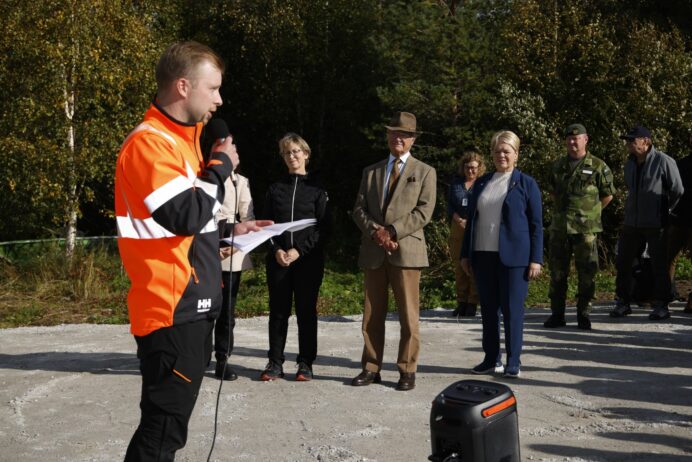
On Thursday, August 29, 2024, King Carl XVI Gustaf of Sweden visited the Tengeliö River fishways being built at the Portimokoski power plant of Tornionlaakson Voima in Ylitornio. The visit is part of a broader familiarisation visit to the Torne River valley region under the TRIWA LIFE project (The Torne River International Watershed LIFE). The largest river restoration project in Europe aims to restore river and stream environments on both the Finnish and Swedish sides. Sakke Rantala, CEO of Tornionlaakson Voima, an associate company of Pohjolan Voima, gave a speech at the event.
Speech at the Portimokoski Fishway on August 29, 2024
Your Majesty the King of Sweden, esteemed ministers, distinguished guests,
I would like to warmly welcome you all to premises of our hydropower company. My name is Sakke Rantala, and I am the CEO of this hydropower company, Tornionlaakson Voima. Our company, owned by Tornionlaakson Sähkö, regional energy company, and PVO-Vesivoima, a subsidiary of Pohjolan Voima, has been operating in the area for decades. The permit holders for this fishway are this hydropower company together with the municipalities of Ylitornio and Pello.
The old hydropower plant was built over a hundred years ago. Before that, more than 250 years ago, there was also a sawmill and a mill in the area. The current Portimokoski hydropower plant will soon be 40 years old. The new plant represents more modern and efficient energy production, and its capacity is ten times that of the old one. The nearby canal was built to achieve a higher head and more power. Later, the old power plant was completely decommissioned. The fishway is located in the old channel. Another fishway is being built at the upper dam. In all, we are witnessing yet another historical layer being added to this area.
Hydropower has long been a part of societal development. Initially, it served as mills and sawmills, and later the focus shifted to electricity production from hydropower. The benefits of mills and sawmills were very concrete and local, whereas electricity is abstract and has now become a given.
In the power system, electricity production and consumption must always be balanced. The superpower of flexible hydropower is its ability to balance the system. Hydropower’s role in societal development has been crucial as society first industrialized and later digitalized. Today, electricity is critical infrastructure. How long could you manage without electricity?
With climate change and the energy transition, the role of hydropower has changed, but it is even more important now: variable wind and solar power need all the flexibility available. In Finland and Sweden, the role of hydropower is extremely important to enable secure transition.
In addition to the power system, hydropower and dams also have other externalities, both positive and negative. On the positive side, regulation has helped manage floods and droughts. Actually, the majority of the world’s dams were built for these purposes. On the negative side, rapids disappear, and migratory fish cannot pass the dams. The negative impacts are compensated for in various ways.
Here in the Tengeliö River area, our obligations mainly consist of fish stocking. These compensate for the harm caused by the dam to people and livelihoods. However, today’s societal atmosphere increasingly emphasizes biodiversity and intrinsic natural values.
Combatting biodiversity loss is even more challenging than fighting climate change. While emissions can be measured objectively, biodiversity has a strong subjective and local dimension: which species is the most important to protect? Will fish migrate to our nearby river?
This project is a model example of how climate action, livelihoods, and biodiversity can be reconciled. The goal is for fish to migrate and reproduce naturally, for the rapids environment to be suitable for various species, for fishers to get their catch, and for the power system to receive flexible electricity. This project demonstrates that we can find solutions that benefit both people and nature.
Successfully reconciling these important issues (climate, livelihoods, and biodiversity) could be a societal vision. It could even be a Nordic vision, since nature expands over the boarders of our neighbouring countries.
Collaboration is crucial in solving these challenges both at the societal and local levels. This project can only succeed through good cooperation. The need for collaboration will continue even after this construction project is completed. I want to thank all parties in both Sweden and Finland for the smooth cooperation.
I wish the entire TRIWA LIFE project, and especially the builders of this fishway, the best of luck.
Sakke Rantala
CEO, Tornionlaakson Voima Oy
Photo: CEO Sakke Rantala of Tornionlaakson Voima gave a speech at the Tengeliö River fishway project site at the Portimokoski hydropower plant. Finland’s Minister of Agriculture and Forestry Sari Essayah (left), King Carl XVI Gustaf of Sweden and County governor Lotta Finstorp attended the excursion.